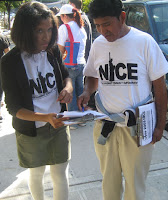One of the most well known works by Mexican artist Diego Rivera, “Man…” was a massive 63-foot-long portrait of workers planned for New York’s Rockefeller Center. The artwork would eventually be destroyed under a cloud of controversy:
The painter believes that his friendship with the Rockefeller family will allow him to insert an unapproved representation of Soviet leader Vladimir Lenin into a section portraying a May Day parade. The real decision-making power lies with the Center's building managers, who abhor Rivera's propagandistic approach. Horrified by newspaper articles attacking the mural's anti-capitalist ideology, they order Rivera to remove the offending image. When Rivera refuses, offering to balance the work with a portrait of Abraham Lincoln on the opposing side, the managers pay his full fee, bar him from the site, and hide the mural behind a massive drape. Despite negotiations to transfer the work to the Museum of Modern Art and demonstrations by Rivera supporters, near midnight, on February 10th, 1934, Rockefeller Center workmen, carrying axes, demolish the mural.Rivera would go on to create a smaller version in Mexico City of the destroyed mural. Though he would never work in the U.S. again some of his works like “Detroit Industry” still stands today:
Online Sources- YouTube, The Latin Americanist, Wikipedia, PBS

